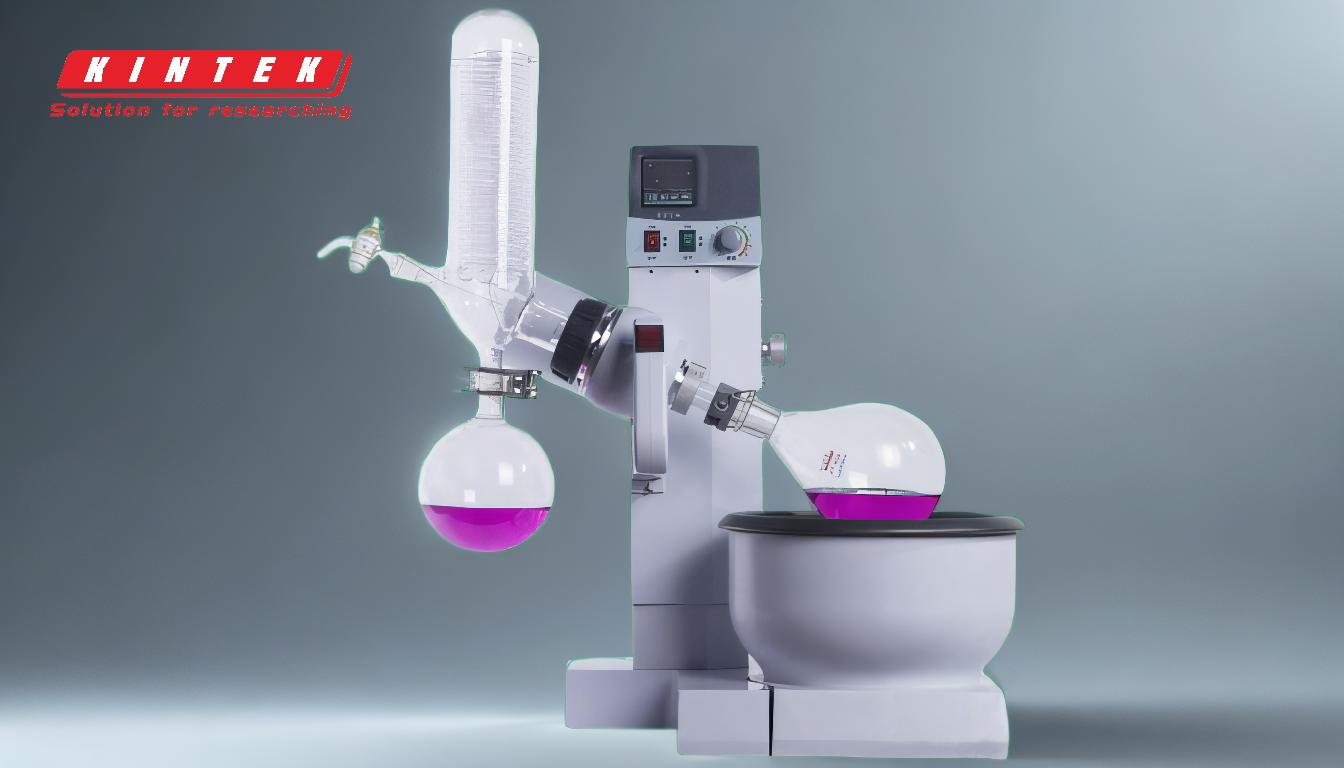Rotary evaporation is a critical technique in organic chemistry, primarily used for the efficient removal of solvents from reaction mixtures, distillation, and concentration of solutions. By reducing the pressure and lowering the boiling point of solvents, rotary evaporation prevents thermal degradation of sensitive compounds, making it ideal for isolating products, purifying solvents, and preparing samples for further analysis. Its applications span from lab-scale organic synthesis to industrial processes like natural product extraction, flavor and fragrance creation, and crude oil processing. The technique's versatility, speed, and ability to handle volatile and heat-sensitive compounds make it indispensable in modern organic chemistry laboratories.
Key Points Explained:

-
Solvent Removal and Isolation of Products
- Rotary evaporators are primarily used to remove volatile organic solvents from reaction mixtures after chemical synthesis.
- By lowering the pressure and using a warm-water bath, the boiling point of the solvent is reduced, enabling gentle evaporation without damaging heat-sensitive compounds.
- This process isolates the desired product, which remains in the flask while the solvent is collected in a separate receiving flask.
-
Distillation of Mixed Solvents
- Rotary evaporation is highly effective for separating mixed solvents with different boiling points.
- The technique allows for the selective removal of one solvent at a time, depending on its boiling point under reduced pressure.
- This is particularly useful in processes like liquid-liquid extraction, where multiple solvents are involved.
-
Concentration of Solutions
- Rotary evaporators are widely used to concentrate solutions by evaporating excess solvents.
- This is essential in preparing samples for analysis, such as in chromatography or spectroscopy, where a higher concentration of the target compound is required.
- The process is faster and more efficient than traditional methods like open-air evaporation.
-
Preparation for Freeze-Drying
- Rotary evaporation is often a preliminary step in freeze-drying (lyophilization) processes.
- By removing the majority of the solvent, the sample is concentrated and ready for the final freeze-drying step, which removes residual moisture.
- This is particularly important in the preparation of biological or pharmaceutical samples.
-
Chemical Synthesis Under Reflux
- Rotary evaporators can be used in conjunction with reflux setups to recover solvents during chemical reactions.
- This allows for the reuse of solvents, making the process more cost-effective and environmentally friendly.
-
Extraction of Natural Compounds
- Rotary evaporation is a key technique in the extraction of natural products, such as essential oils, cannabinoids, and other bioactive compounds.
- The gentle evaporation process preserves the integrity of heat-sensitive compounds, ensuring high-quality extracts.
-
Industrial Applications
- Beyond laboratory use, rotary evaporation is employed in industries like crude oil processing, flavor and fragrance creation, and molecular cooking.
- For example, it is used to separate cannabinoids in cannabis processing and to concentrate flavors in the food industry.
-
Advantages Over Traditional Methods
- Rotary evaporation offers superior heat transfer rates compared to traditional flask processes, reducing the risk of thermal degradation.
- The reduced pressure and lower temperatures prevent unwanted side reactions like oxidation or decomposition, ensuring the purity of the final product.
- The spinning motion of the flask increases the surface area for evaporation, making the process faster and more efficient.
-
Versatility and Convenience
- Rotary evaporators are versatile tools that can handle a wide range of solvents and compounds.
- They are easy to operate and provide consistent results, making them a staple in organic chemistry laboratories.
-
Environmental and Economic Benefits
- By enabling solvent recovery, rotary evaporation reduces waste and lowers costs associated with chemical synthesis.
- The ability to reuse solvents aligns with green chemistry principles, promoting sustainability in laboratory practices.
In summary, rotary evaporation is a cornerstone technique in organic chemistry, offering a fast, efficient, and gentle method for solvent removal, distillation, and concentration. Its applications extend from routine laboratory tasks to complex industrial processes, making it an indispensable tool for chemists and researchers.
Summary Table:
| Key Applications | Benefits |
|---|---|
| Solvent Removal | Gentle evaporation prevents thermal degradation of sensitive compounds. |
| Distillation of Mixed Solvents | Separates solvents with different boiling points efficiently. |
| Concentration of Solutions | Faster and more efficient than traditional methods. |
| Preparation for Freeze-Drying | Concentrates samples for lyophilization. |
| Extraction of Natural Compounds | Preserves heat-sensitive compounds for high-quality extracts. |
| Industrial Applications | Used in cannabis processing, flavor creation, and crude oil refining. |
| Environmental Benefits | Enables solvent recovery, reducing waste and costs. |
Ready to enhance your lab's efficiency with rotary evaporation? Contact us today to learn more!










